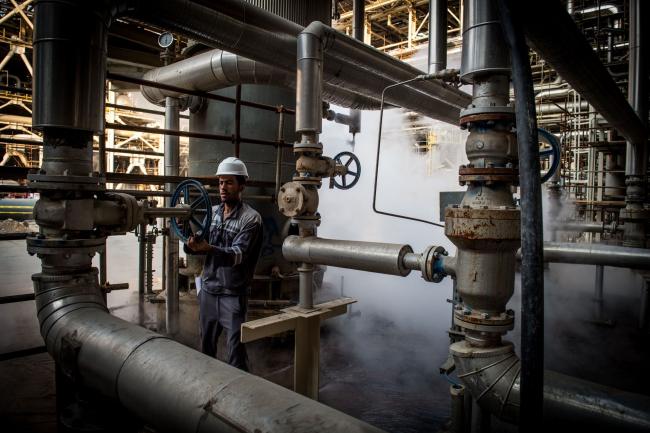(Bloomberg) -- Oil jumped close to $70 a barrel after a U.S. airstrike ordered by President Donald Trump killed a top Iranian general in Iraq, intensifying fears of conflict in the world’s most important crude-producing region.
In a turbulent start to the Asian day marked by unusually heavy trading, futures in London and New York surged by more than 4% to levels not seen since the attacks on Saudi Arabia’s infrastructure in September. The strike near Baghdad airport killed Qassem Soleimani, the Iranian general who led the Revolutionary Guards’ Quds force, according to a Defense Department statement.
While no oil installations or production were impacted, the killing of one of Iran’s most powerful generals is a provocation that ratchets up tension between Washington and Tehran, heightening fears of an armed confrontation that could pull in other countries. As focus shifts to how Iran will react, the country’s supreme leader, Ayatollah Ali Khamenei, vowed that “severe retaliation” awaits the killers of Soleimani, according to a statement.
“This is more than just bloodying Iran’s nose,” Stephen Innes, chief market strategist at AxiTrader Ltd. said in a note. “This is an aggressive show of force and an outright provocation that could trigger another Middle East war.”
Crude prices had pared back some of their immediate gains by midday in Singapore but remained at the highest levels since September. London’s Brent crude for March settlement was up $2.12, or 3.2%, at $68.37 a barrel on the ICE (NYSE:ICE) Futures Europe exchange at 1:25 p.m. Singapore time. It earlier jumped as much as 4.4% to $69.16 a barrel.
In New York, West Texas Intermediate for February delivery was 3.1% higher at $63.07 a barrel. The contract earlier advanced as much as 4.4% to $63.84, exceeding September’s levels to the highest since May. Total aggregate volume for Brent and WTI was about 20 times the 30-day average.
Tensions have been building between Washington and Tehran after an Iran-backed Iraqi militia stormed the American embassy in Baghdad to protest deadly U.S. airstrikes earlier this week. Saudi Arabia’s energy facilities as well as foreign tankers in and around the Persian Gulf have been the target of several attacks over the past year -- a region that includes OPEC’s five biggest producers.
The U.S. and Iran are already facing off over Trump’s crippling economic campaign against Tehran and suspected Iranian reprisals. Defense Secretary Mark Esper said on Thursday that America was ready to deploy more force in Iraq after the attack on its embassy. While details remained unclear, a person familiar with the developments said an Iraqi militia leader, Abu Mahdi al-Muhandis, was also killed.
The strike escalates an already tense three-way situation between the U.S. and major oil producers Iran and Iraq. The two Middle East countries combined pumped more than 6.7 million barrels a day of oil last month, according to data compiled by Bloomberg, more than one-fifth of OPEC output.
Energy exports from both countries also rely on the Strait of Hormuz, the narrow and crucial oil and natural gas shipping choke-point that’s always in focus when Middle East tensions flair, particularly with Iran.
“I expect tensions in the region to now intensify,” said Howie Lee, a Singapore-based economist at Oversea-Chinese Banking Corp. “Going into an election year in the U.S., the maximum pressure campaign by President Trump on Iran may intensify further.”
